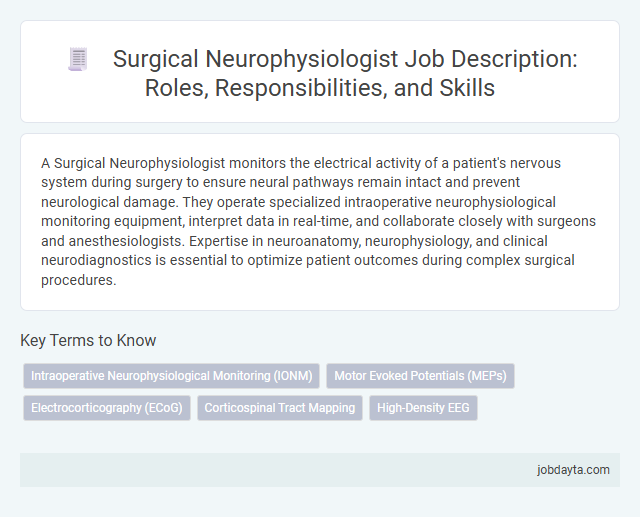A Surgical Neurophysiologist monitors the electrical activity of a patient's nervous system during surgery to ensure neural pathways remain intact and prevent neurological damage. They operate specialized intraoperative neurophysiological monitoring equipment, interpret data in real-time, and collaborate closely with surgeons and anesthesiologists. Expertise in neuroanatomy, neurophysiology, and clinical neurodiagnostics is essential to optimize patient outcomes during complex surgical procedures.
Overview of a Surgical Neurophysiologist
A Surgical Neurophysiologist plays a critical role in monitoring the nervous system during surgical procedures to ensure patient safety and optimal outcomes. Your surgeon depends on their expertise to prevent neurological damage in real time.
- Intraoperative Monitoring - They use advanced techniques to track brain, spinal cord, and nerve function during surgery.
- Risk Reduction - Their real-time data helps reduce the risk of nerve injury and postoperative complications.
- Collaborative Role - They work closely with neurosurgeons, anesthesiologists, and surgical teams for precise neurophysiological assessment.
The expertise of a Surgical Neurophysiologist is essential for maintaining neural integrity during complex surgical interventions.
Key Roles and Responsibilities
A Surgical Neurophysiologist specializes in monitoring the nervous system during surgical procedures to ensure patient safety and optimal outcomes. They utilize advanced neurophysiological techniques to detect and prevent neurological damage.
Key roles include interpreting intraoperative neurophysiological data and collaborating closely with surgeons and anesthesiologists. Your expertise helps guide surgical decisions, minimizing risks and improving recovery rates.
Required Educational Background
A Surgical Neurophysiologist must have a strong foundation in neuroscience or a related field, typically requiring a bachelor's degree in biology, neurophysiology, or biomedical engineering. Advanced education often includes a master's degree or specialized training in intraoperative neurophysiological monitoring (IONM) techniques. Your expertise is enhanced through certifications such as CNIM (Certified Neurophysiological Intraoperative Monitoring) to ensure proficiency in monitoring neural functions during surgery.
Essential Technical Skills
A Surgical Neurophysiologist plays a critical role in monitoring the nervous system during complex surgical procedures. Their expertise helps prevent neurological damage and ensures patient safety throughout the operation.
Essential technical skills include proficiency in intraoperative neurophysiological monitoring techniques such as EEG, EMG, and evoked potentials. Mastery of advanced neurophysiological equipment and software is required to accurately interpret data in real-time. Your ability to troubleshoot equipment and communicate effectively with the surgical team is vital for successful outcomes.
Typical Work Environment
What is the typical work environment for a surgical neurophysiologist? Surgical neurophysiologists usually work in hospitals or specialized surgical centers where neurological surgeries are performed. They operate in sterile, high-tech environments alongside surgeons and medical teams to monitor neural function during operations.
Importance in Surgical Procedures
Surgical neurophysiologists play a critical role in monitoring the nervous system during complex surgical procedures. Their expertise helps prevent nerve damage by providing real-time data on neural function.
During surgeries such as spinal operations or brain tumor removal, these specialists use advanced electrophysiological techniques to guide surgeons safely. Understanding their importance ensures your surgical outcomes are optimized and risks minimized.
Collaboration with Medical Teams
| Role | Surgical Neurophysiologist |
|---|---|
| Primary Focus | Collaboration with Medical Teams |
| Key Responsibilities |
|
| Collaboration Benefits |
|
| Collaboration Tools |
|
| Impact on Surgical Workflow |
|
Certification and Licensing Requirements
Surgical neurophysiologists require specialized certification to ensure expertise in intraoperative neurophysiological monitoring. Certification is typically obtained through credentials such as the CNIM (Certified Neurophysiological Intraoperative Monitoring) or DABNM (Diplomate of the American Board of Neurophysiologic Monitoring). Licensing requirements vary by state, but most professionals must hold a valid medical or allied health license alongside their certification.
Career Progression Opportunities
Surgical neurophysiologists specialize in monitoring and assessing neural function during surgeries to prevent neurological deficits. Career progression in this field offers opportunities to advance into leadership, education, and research roles within healthcare settings.
- Clinical Specialist - Focus on expert intraoperative neurophysiological monitoring and complex case management.
- Leadership Roles - Transition into supervisory positions overseeing neurophysiology teams and hospital programs.
- Research and Education - Engage in pioneering research projects or educate future surgical neurophysiologists through academic institutions.
Challenges and Rewards of the Role
Surgical neurophysiologists play a critical role in monitoring the nervous system during complex surgical procedures to prevent neurological damage. Their expertise requires precision, quick decision-making, and a deep understanding of neuroanatomy to ensure patient safety.
- High-Stress Environment - Surgical neurophysiologists often work under intense pressure during surgeries where every second counts.
- Technical Complexity - The role demands mastery of advanced neuro-monitoring equipment and real-time data interpretation.
- Life-Saving Impact - Their work directly contributes to reducing postoperative neurological complications, improving patient outcomes significantly.
Related Important Terms
Intraoperative Neurophysiological Monitoring (IONM)
Surgical neurophysiologists specialize in intraoperative neurophysiological monitoring (IONM) to assess the functional integrity of neural structures during surgeries, reducing the risk of neurological damage. Utilizing techniques like electromyography (EMG) and somatosensory evoked potentials (SSEPs), they provide real-time feedback to surgeons, enhancing patient safety and surgical outcomes.
Motor Evoked Potentials (MEPs)
Surgical neurophysiologists specializing in Motor Evoked Potentials (MEPs) play a critical role in monitoring neural pathways during spinal and brain surgeries to prevent postoperative motor deficits. Utilizing transcranial electrical stimulation, MEPs provide real-time assessment of corticospinal tract integrity, enabling immediate intervention upon detecting potential neural injury.
Electrocorticography (ECoG)
Surgical Neurophysiologists specialize in Electrocorticography (ECoG) to monitor cortical electrical activity during brain surgery, enhancing precision in epilepsy and tumor resections. ECoG provides real-time mapping of functional brain areas, reducing neurological risks and improving surgical outcomes through direct cortical recordings.
Corticospinal Tract Mapping
Surgical Neurophysiologists specialize in Corticospinal Tract Mapping to enhance intraoperative monitoring and minimize neurological damage during brain and spinal surgeries. Utilizing advanced techniques like motor evoked potentials, they provide real-time functional assessment of corticospinal pathways, improving surgical precision and patient outcomes.
High-Density EEG
Surgical neurophysiologists specializing in High-Density EEG utilize advanced electrode arrays to capture detailed cortical activity for precise brain mapping during neurosurgical procedures. High-Density EEG enhances the detection of epileptiform discharges and functional connectivity, improving surgical outcomes in epilepsy and tumor resections.
Surgical Neurophysiologist Infographic

 jobdayta.com
jobdayta.com